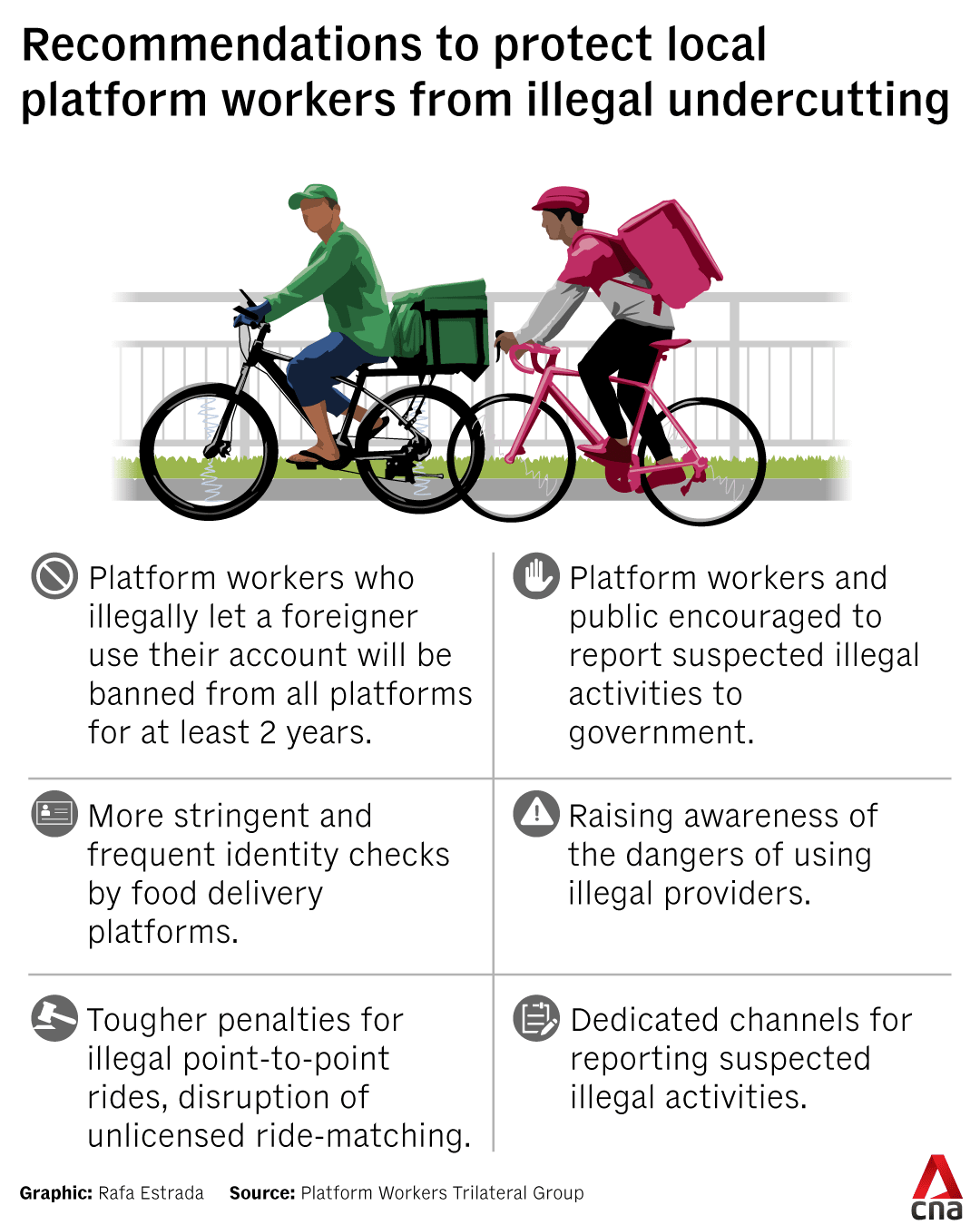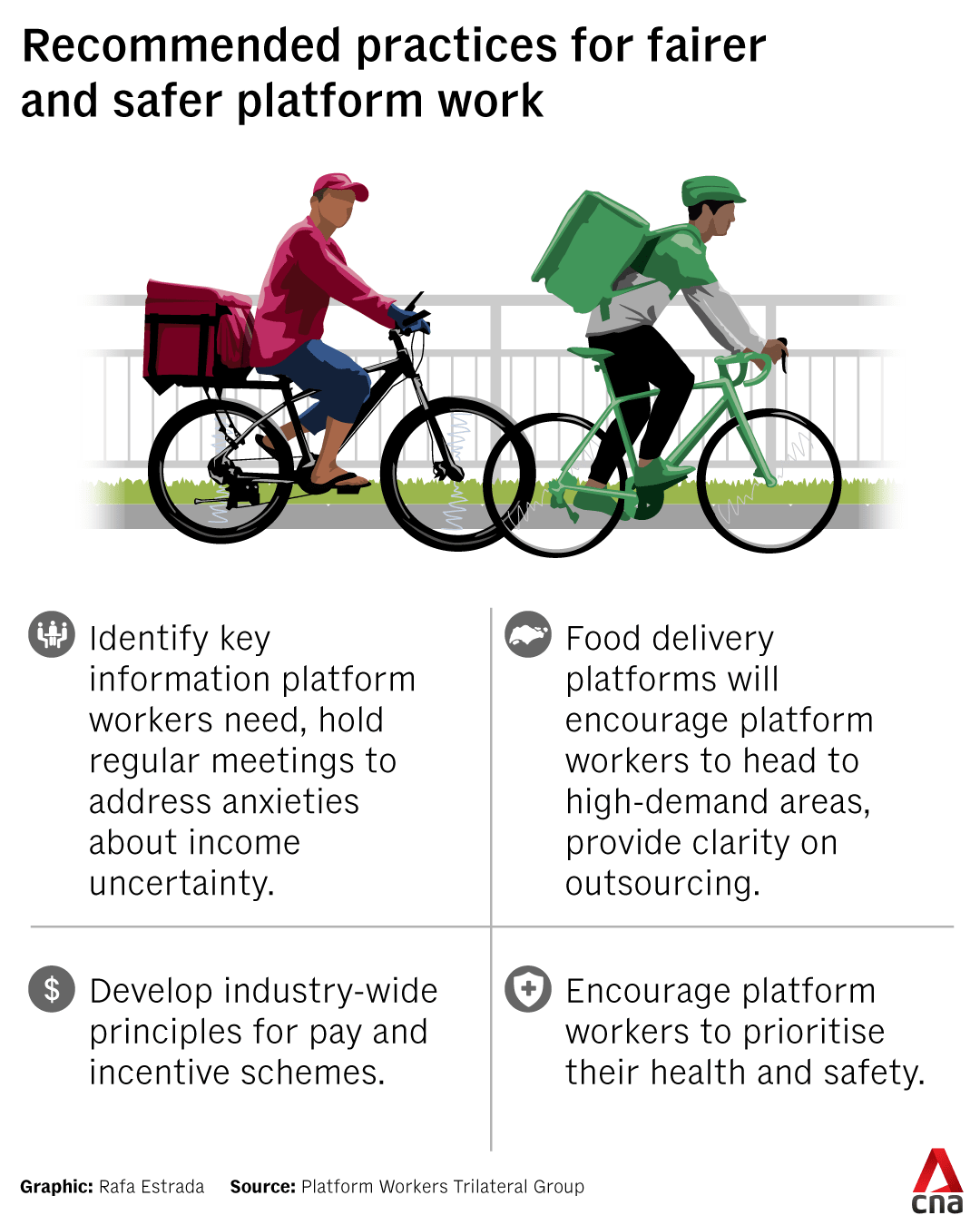Tougher penalties, account bans among recommendations by trilateral group to protect local platform workers
Major platform operators have also agreed to a cross-platform ban on platform workers who let foreigners use their accounts to work illegally.


This audio is generated by an AI tool.
SINGAPORE: A trilateral group tasked to look into the issue of foreigners illegally performing platform work released a set of 10 recommendations on Thursday (Sep 11), which includes stronger enforcement and tougher penalties against illegal point-to-point rides.
These illegal rides comprise foreign-registered vehicles providing cross-border trips and point-to-point trips within Singapore, and trips by local or foreign drivers who match with passengers on unlicensed channels like Telegram chat groups.
Currently, offenders can be jailed for up to six months and fined up to S$3,000 (US$2,300). Their vehicles may also be forfeited. The government will push to increase the penalties, the trilateral group said in a statement.
At a briefing for media on Wednesday, representatives from the trilateral group did not specify what these higher penalties will be, but said they will be set at a sufficiently deterrent level after consulting with the Attorney-General’s Chambers.
Another recommendation by the trilateral group is for any platform worker who has let a foreigner use his or her account to work illegally to be banned from all major platforms for at least two years.
Previously, suspension of accounts took place on individual platforms and did not happen on a cross-platform basis.
When the recommendations are implemented, platform operators will notify the Ministry of Manpower (MOM) about suspected cases of accounts being misused.
MOM will then investigate all such reports and platform operators will ban the platform worker if he or she is found to have committed an offence under the Employment of Foreign Manpower Act.
On Thursday, Senior Minister of State for Manpower and Health Koh Poh Koon said that platform operators still have the prerogative to permanently ban the platform worker if they wish do to so.
He added that foreigners who perform platform work illegally already face stringent penalties under the law.
They can be jailed for up to two years and fined up to S$20,000. A local who allows a foreigner to misuse his or her platform account can face the same penalties.
In the past few years, MOM received an average of 50 complaints a year about alleged misuse of platform worker accounts. Most of the complaints were not substantiated upon investigation, MOM said.
The trilateral group was set up in July and comprises MOM, the Ministry of Transport, the National Trades Union Congress (NTUC) and Grab Singapore.
Since July, over 70 vehicles have been caught providing illegal point-to-point services.
Enforcement was also stepped up at more than 30 potential hotspots, resulting in checks of 644 platform workers. Four were arrested for working illegally.
The recommendations were announced at a press conference by Dr Koh, Senior Minister of State for Transport Sun Xueling, NTUC Secretary-General Ng Chee Meng and Grab’s group managing director of operations Yee Wee Tang.
The trilateral group said it engaged platform operators Amazon Flex, ComfortDelGro Zig, Deliveroo, Foodpanda, Gojek, Grab, Lalamove, Ryde and Tada in the course of its work.
The recommendations will be adopted by all these platform operators and implemented in phases with some, such as those requiring legislative amendments, taking more time.
STAMPING OUT ILLEGAL UNDERCUTTING
Dr Koh said a key consideration for the recommendations was that they should retain the advantages of the platform ecosystem while being able to be implemented in a sustainable manner.
The recommendations focus on two areas: stamping out illegal undercutting of Singapore platform workers and establishing practices for fairer and safer platform work.
Aside from tougher penalties, the government will strengthen enforcement against illegal point-to-point rides by engaging online platforms to take down apps, channels and advertisements that facilitate illegal ride-matching.
The government will also strengthen its own ability to block or remove these if online platforms are uncooperative, said the trilateral group.
One recent example is the InDrive app, which allowed users to request trips between Johor and Singapore and within Singapore.
However, InDrive is not a licensed ride-hail operator and its vehicles do not appear to have the requisite public service vehicle licences, said the Land Transport Authority (LTA) in response to CNA's queries.
LTA said it engaged InDrive, which removed its app from local app stores and blocked users from requesting rides to or from locations in Singapore. This means that users who still have the app cannot use it for trips in Singapore.
Another recommendation is for food delivery platforms to strengthen detection and prevention of illegal activities.
One way this will be done is through regular and randomised identity checks on platform workers. Platform operators with existing checks should do so more frequently and stringently.
Dedicated channels for platform workers and the public to report suspected illegal activities – one of the recommendations – have already been implemented.
In its statement, the trilateral group encouraged people to report suspected cases to the government, instead of taking it upon themselves to confront platform workers they suspect to be illegal.
There are also plans to educate the public about the safety risks commuters face when they use unlicensed point-to-point services.

FAIRER AND SAFER PLATFORM WORK
For fairer and safer platform work, platform operators and platform work associations will work together to develop a set of industry-wide principles on payment issues and incentive schemes, said the trilateral group.
Elaborating on these principles, Mr Ng said that earnings should be fair and transparent.
"Incentives – which are variable – should serve to complement overall earnings, instead of constituting a substantial portion of earnings," he said.
"Platforms implementing structural changes to incentive schemes which are expected to materially impact earnings should engage with the (platform work associations) for visibility and constructive discussions on these changes.
"Any incentive scheme should safeguard the safety and health of workers and should not be designed to encourage them to work excessively long hours without adequate rest."
Together, platform operators and platform work associations will also identify key information to provide to platform workers to address anxieties around income uncertainty, and schedule regular meetings to discuss key issues.
Platform work associations will also continue to encourage platform workers to prioritise and take care of their health and safety, reiterating their individual responsibility.
The NTUC-affiliated National Delivery Champions Association, National Private Hire Vehicles Association and National Taxi Association have had legal powers to collectively represent platform workers since January.
Having ample notice on changes to incentive schemes and not letting incentives form a large part of a platform worker’s take-home pay are among the issues being discussed between platform work associations and platform operators.

MORE SCRUTINY ON OUTSOURCED WORKERS
The trilateral group pointed out that some foreigners who perform platform work are legitimate work pass holders.
These foreign workers are employed by third-party fleets under outsourcing arrangements with platform operators. They may also be in-house delivery staff for food and beverage or retail businesses.
These individuals differ from platform workers as they do not receive tasks through an algorithm and are paid a fixed salary by their employer, said Dr Koh.
Mr Yee said Grab works with outsourced companies on a limited basis, only engaging them for "high-demand areas where we consistently do not have enough platform workers to meet high consumer demand".
"These logistics companies account for only a single-digit percentage of our total delivery fleet, and the majority of them are Singaporean citizens and permanent residents."
These outsourcing practices by food delivery platform operators are the subject of two recommendations by the trilateral group.
Going forward, outsourcing companies will submit the work pass documentation of foreign workers involved in platform work to food delivery platform operators.
Food delivery platform operators that outsource work through other means should also do their due diligence where needed.
Under another recommendation, food delivery platform operators will provide more clarity and assurance to platform workers on their outsourcing practices. They will also encourage platform workers to head to high-demand areas.
Grab will do this by giving platform workers priority over outsourced workers when booking shifts in high-demand areas.
Shifts are time slots in specific areas that give platform workers priority for orders within that zone. Platform workers on shift can potentially get better and more consistent jobs, and are not required to fulfil orders outside the zone.
Shifts open for booking every Thursday, and some shifts in high-demand areas are open to outsourced workers.
From Oct 6, Grab will start letting local food delivery platform workers know the locations of high-demand areas and let them book shifts 90 minutes ahead of outsourced workers. Any remaining slots after that can be filled by outsourced workers.
"Ultimately, we want more platform workers to be in these high-demand areas. When we have a stable supply of platform workers in these areas, we can reduce our reliance on outsourced logistics companies.
"To ensure platform workers know where high-demand zones are, we have started labelling shift slots in these areas as hot zones. We hope to see more platform workers signing up for these slots," said Mr Yee.
















